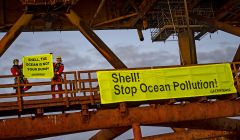Environment / Greenpeace returns to protest in Brent oil field
GREENPEACE activists have returned to the Brent oil field, 115 miles north east of Shetland, to protest against Shell’s plans to leave the legs of three platforms standing in the sea after decommissioning the topsides.
The environmental campaigners accuse the oil company of abandoning an estimated 11,000 tonnes of oil on the seabed.
The oil company is refuting these accusations, saying its decision to leave the concrete legs in situ was the result of 10 years of research.
Shell also said that the oil sediments are encased in one metre thick reinforced concrete structures, and even if some oil seeps out its impact on the environment would be minimal.
Earlier this year, Shell UK was granted an interdict which prevents Greenpeace activists from boarding or attempting to board the Brent Alpha, Brent Bravo, Brent Charlie and Brent Delta oil installations.
The Court of Session also granted a 500-metre exclusion zone following Greenpeace’s protest in the Brent oil field in October last year.
On Tuesday the Greenpeace ship Esperanza approached the exclusion zone of Shell’s platform in the Brent oil field with protestors on board waving banners stating Shell, the ocean is not your dump.
Greenpeace marine biologist Dr Christian Bussau said: “Shell still wants to dismantle the platforms on the cheap, and the UK government is colluding with them to allow it.
“Shell must dismantle this platform safely on-shore, which would be better for the environment and create jobs in an industry that’s currently struggling.
“Shell is falling behind its competitors. It must urgently get out of the dirty oil and gas industry and pivot its business to renewable energy.”
Greenpeace said that according to the oil company’s own decommissioning proposals, it will leave behind the remains of four platforms in the Brent oil field.
Become a member of Shetland News
Shell estimates those platforms contain 640,000 cubic metres of oily water and 40,000 cubic metres of oily sediment with a total content of more than 11,000 tonnes of oil.
In October last year, the member states of the OSPAR Commission (Convention for the Protection of the Marine Environment of the North-East Atlantic) met in London and discussed Shell’s plans, with the UK government indicating its approval. But the final decision has been postponed and is pending.
An approval from the member states would set a dangerous precedent for other oil companies and further the destruction of the North Sea, the campaigners said.
Shell said leaving the Brent field legs behind would not be a recurring issue in the North Sea, as all offshore installations in the “north-east Atlantic” built after 1999 are designed to be removed completely.
A company spokesman said: “Decommissioning Brent is a complex, major engineering project, because of its size, age, infrastructure, and the harsh environment of the North Sea.
“Our recommendations are the result of 10 years of research, involving more than 300 scientific and technical studies.
“We established an independent group of scientific experts to review the findings and ensure all feasible decommissioning options were investigated thoroughly.
“We submitted our recommendations following extensive stakeholder engagement and only when we were confident that that they were safe, technically achievable, environmentally sound and socially and economically responsible.”
Greenpeace is also calling on Shell to get out of the oil and gas exploration business now and switch completely to renewable energy.
Become a member of Shetland News
Shetland News is asking its many readers to consider paying for membership to get additional features and services: -
- Remove non-local ads;
- Bookmark posts to read later;
- Exclusive curated weekly newsletter;
- Hide membership messages;
- Comments open for discussion.
If you appreciate what we do and feel strongly about impartial local journalism, then please become a member of Shetland News by either making a single payment, or setting up a monthly, quarterly or yearly subscription.































































